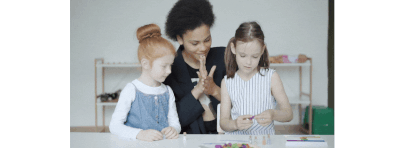
Key Takeaways
- RBTs can work with diverse populations, including infants, preschoolers, elementary-aged children, teenagers, and adults.
- Deciding which population to work with involves understanding your preferences, strengths, and long-term goals.
- You can start your journey today with our RBT 40-Hour Training, which equips you with the foundational skills needed to succeed with any population.
Who Do RBTs Work With?
Registered Behavior Technicians (RBTs) have the opportunity to work with a wide range of populations, including infants, preschoolers, elementary-aged children, teenagers, and adults. Each group has unique needs and goals, offering RBTs the chance to make a meaningful impact at every stage of life.

How to Decide What Populations You Want to Work With as an RBT
One of the great aspects of being a Registered Behavior Technician (RBT) is the variety of populations you can work with. From infants to adults, RBTs are needed to provide support across all stages of life.
Why Think about Populations in Your RBT Career
Infants & Preschoolers
Play-based interventions to build foundational skills like communication, social interaction, and motor development.
Elementary-Aged Children
Focus on academic readiness, behavioral support, and social skills. After-school activities can be a creative way to support development.
Teenagers
Support in school, social skills interventions, and preparation for adulthood. Help with peer relationships and independence.
Adults
Vocational training, community integration, and life skills support, including job coaching and daily living skills.

Factors to Consider When Choosing a Population
- In-home: One-on-one work with clients and training family members.
- School: Supporting students in academic routines and collaborating with teachers.
- Community: Assisting clients in acquiring life and recreational skills.
- Adult work settings: Helping adults develop job and life skills in structured environments.
Next Steps
If you’re still exploring the RBT field, check out these helpful articles:
Final Thoughts
Choosing the population you want to work with as an RBT is an exciting opportunity. Whether it’s preschoolers, teens, or adults—there’s a great fit for everyone.
Start your journey today with our RBT 40-Hour Training and gain the skills to succeed in any setting.
